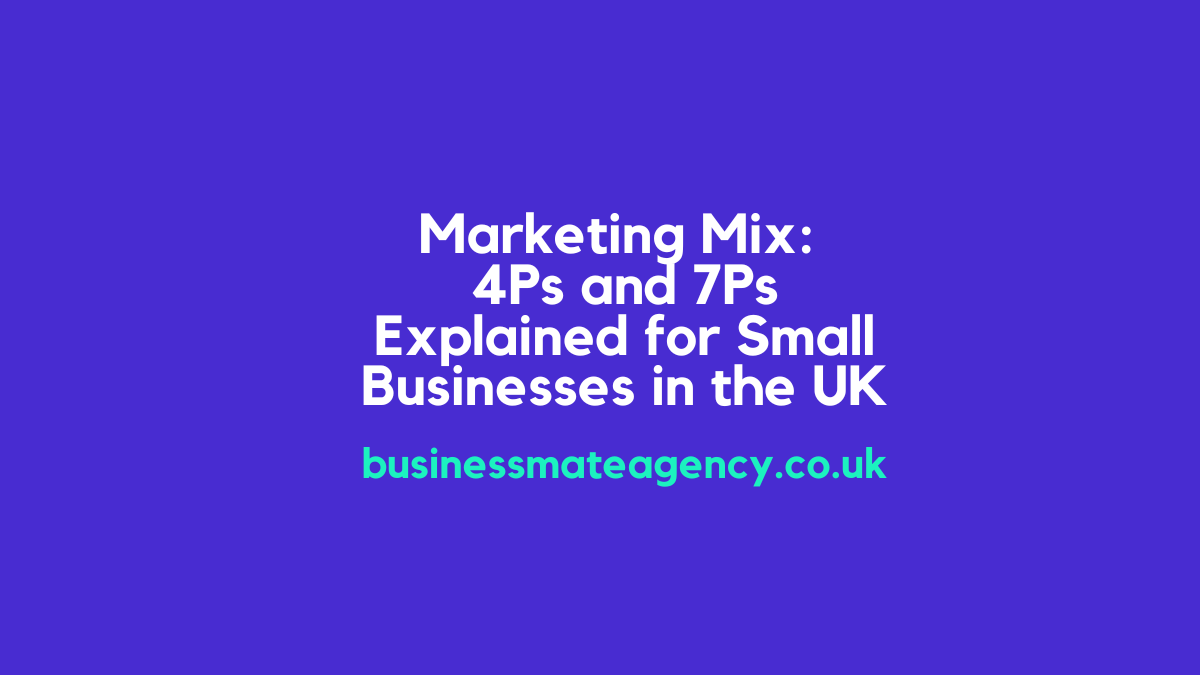The marketing mix 4ps and 7ps is a proven framework that helps UK SMEs plan and execute marketing strategies effectively. Moreover, applying it allows businesses to move from guesswork to a structured approach that drives measurable growth.
Whether you run a retail shop in Birmingham, a café in Cardiff, or a consultancy in London, the marketing mix 4ps and 7ps clarifies product offerings, pricing, distribution, promotions, staff, processes, and proof of credibility. Consequently, it improves decision-making and ensures all marketing actions contribute to results.
👉 Ready to implement a structured marketing framework? Contact Business Mate or book a strategy call
Why The Marketing Mix 4Ps And 7Ps Is Essential For UK SMEs
Marketing is about more than advertising; it is about delivering a complete customer experience. Furthermore, the marketing mix 4ps and 7ps helps businesses:
Understand and predict customer needs accurately
Position themselves competitively in their local market
Allocate budgets efficiently across channels
Measure and optimise marketing ROI
In addition, implementing this framework reduces wasted effort, ensures campaigns are results-focused, and highlights the areas where improvements deliver maximum impact.
The Classic Marketing Mix 4Ps Explained
The original 4Ps, introduced by Jerome McCarthy in the 1960s, are ideal for product-focused businesses. They include Product, Price, Place, and Promotion, each critical to effective marketing.
Product Strategy Within The Marketing Mix 4Ps And 7Ps
Your product should solve a customer problem or fulfil a clear need. For example, a London coffee shop offering both traditional espresso and plant-based alternatives demonstrates versatility.
Moreover, product strategy should consider quality, features, and differentiation to stand out in competitive markets. In addition, aligning product design with customer expectations ensures satisfaction and repeat business.
Pricing Strategy In The Marketing Mix 4Ps And 7Ps
Pricing balances profitability, market conditions, and customer perception. For instance, an affordable clothing retailer and a luxury boutique in Chelsea will use very different pricing strategies.
Furthermore, flexible and dynamic pricing can respond to seasonal demand, promotions, or changes in market competition. As a result, pricing strategy maximises revenue while maintaining customer trust.
Place Strategy In The Marketing Mix 4Ps And 7Ps
Place determines how customers access your product or service, both physically and digitally. For example, a Birmingham plumber may optimise Google Maps and local listings, while also offering online booking.
Additionally, expanding through e-commerce platforms or online marketplaces allows businesses to reach a wider audience, consequently increasing potential revenue streams.
Promotion Tactics In The Marketing Mix 4Ps And 7Ps
Promotion involves communicating the value of your product or service. For example, a small bakery using Facebook Ads to promote seasonal offers ensures visibility.
Moreover, integrating influencer marketing, email campaigns, and PR initiatives can further boost engagement and brand recognition. Therefore, promotion strategies must be measured and optimised for impact.
The Extended Marketing Mix 7Ps For Service-Oriented UK SMEs
As service-focused businesses grew, three additional Ps—People, Process, and Physical Evidence—were added to create the 7Ps framework. These are especially crucial for UK service SMEs.
People: Staff And Customer Experience
People represent your employees and their interactions with customers. For instance, a Manchester dental clinic emphasising friendly and skilled staff ensures satisfaction.
Furthermore, investing in staff training improves service consistency and builds long-term loyalty. Consequently, People are vital for service delivery and customer trust.
Process: Streamlining Operations And Service Delivery
Processes ensure consistent service delivery. For example, a digital agency with a structured client onboarding system guarantees smooth client experiences.
Additionally, optimising workflows reduces errors, saves time, and enhances customer satisfaction. As a result, efficient processes support growth and scalability.
Physical Evidence: Demonstrating Quality And Credibility
Physical Evidence provides tangible proof of service reliability. For example, a consultancy showcasing client testimonials, awards, and case studies builds credibility.
Moreover, visible proof reinforces marketing claims and strengthens trust with prospects. Consequently, it is an essential element for service SMEs aiming for repeat business.
See our blog “Marketing Mix Meaning Explained Simply for UK Businesses”.
Marketing Mix 4Ps Vs 7Ps: Understanding The Difference
The 4Ps suit product-focused businesses, while the 7Ps expand the framework for service-driven organisations.
Including People, Process, and Physical Evidence ensures:
Consistent service delivery by staff
Efficient operational workflows
Customer trust through tangible proof
For UK service SMEs, prioritising the 7Ps is crucial to enhance credibility, foster loyalty, and improve long-term client relationships.
Step-By-Step Guide To Applying The Marketing Mix 4Ps And 7Ps
Step 1: Audit Your Current Marketing Mix
Document products, pricing, channels, and promotional activities. This highlights gaps and opportunities.
Step 2: Identify Strengths And Weaknesses
For example, a business may offer a great product, but online visibility could be low. Consequently, addressing weaknesses first ensures maximum impact.
Step 3: Integrate The 7Ps For Service Businesses
Ask: Are staff trained for consistent service delivery? Are testimonials visible? Additionally, are processes standardised for efficiency?
Step 4: Adjust Based On Customer Needs
Focus on the elements most relevant to your target audience. Moreover, review and refine your mix regularly to adapt to market trends and competitor strategies.
Step 5: Combine With Digital Marketing Channels
Integrate SEO, social media, email campaigns, and PPC. Therefore, digital channels amplify the effectiveness of the marketing mix 4ps and 7ps.
Step 6: Measure And Optimise
Track KPIs, analyse results, and refine strategies. As a result, marketing becomes proactive, measurable, and growth-driven.
Practical Applications: Marketing Mix 4Ps And 7Ps In UK SMEs
London Gym Example
Product: Memberships, personal training, online classes
Price: Tiered packages – basic, premium, family
Place: Gym + online classes
Promotion: Meta Ads for seasonal offers
People: Certified trainers and support staff
Process: App-based booking and scheduling
Physical Evidence: Reviews, success stories, modern facilities
London Property Agency Example
Product: Premium property listings
Price: Flexible commission
Place: Google Business Profile, Rightmove
Promotion: Targeted Meta Ads
People: Experienced agents
Process: Streamlined viewings
Physical Evidence: Testimonials and awards
Cardiff Café Example
Product: Specialty coffee and pastries
Price: Loyalty programmes
Place: High-footfall location + delivery apps
Promotion: Instagram + Facebook campaigns
People: Friendly baristas
Process: Efficient ordering system
Physical Evidence: Reviews and user-generated content
These examples demonstrate practical application of the marketing mix 4ps and 7ps for both product and service SMEs in the UK.
Benefits Of Using The Marketing Mix 4Ps And 7Ps
UK SMEs benefit from:
Budget efficiency: Spend where it has the most impact
Customer clarity: Consistent messaging builds trust
Strategic growth: Roadmap for local and national scaling
Competitive advantage: Strengthened market positioning
Service excellence: Builds loyalty through people, processes, and physical evidence
Consequently, aligning all elements ensures coherent brand experiences, improved retention, and higher conversions.
Conclusion
The marketing mix 4ps and 7ps is a practical toolkit for UK SMEs. Applying it ensures every marketing element—product, price, place, promotion, people, process, and physical evidence—aligns with customer expectations.
Furthermore, integrating this framework with digital channels amplifies reach, drives measurable results, and supports sustainable growth.
👉 Start optimising your marketing mix today: Contact Business Mate or book a strategy session
FAQs: Marketing Mix 4Ps and 7Ps
What is the marketing mix 4ps and 7ps?
The marketing mix 4ps includes Product, Price, Place, and Promotion. The 7Ps add People, Process, and Physical Evidence, helping service-based businesses improve customer experience and trust.
What is the difference between the 4Ps and 7Ps of marketing?
The 4Ps suit product-focused businesses, while the 7Ps expand the framework for service businesses, including People, Process, and Physical Evidence for consistency and credibility.
How can UK SMEs apply the marketing mix 4ps and 7ps?
Audit products, pricing, channels, and promotions, integrate the 7Ps for services, and execute campaigns via SEO, social media, email, and PPC.
Can you give an example of the 7Ps for a UK small business?
For a London gym: Product (memberships), Price (tiered packages), Place (gym + online classes), Promotion (Meta Ads), People (trainers), Process (app-based booking), Physical Evidence (reviews, success stories).
Why is understanding the marketing mix important for UK SMEs?
It ensures efficient budget allocation, consistent branding, improved customer satisfaction, and stronger competitive positioning.



